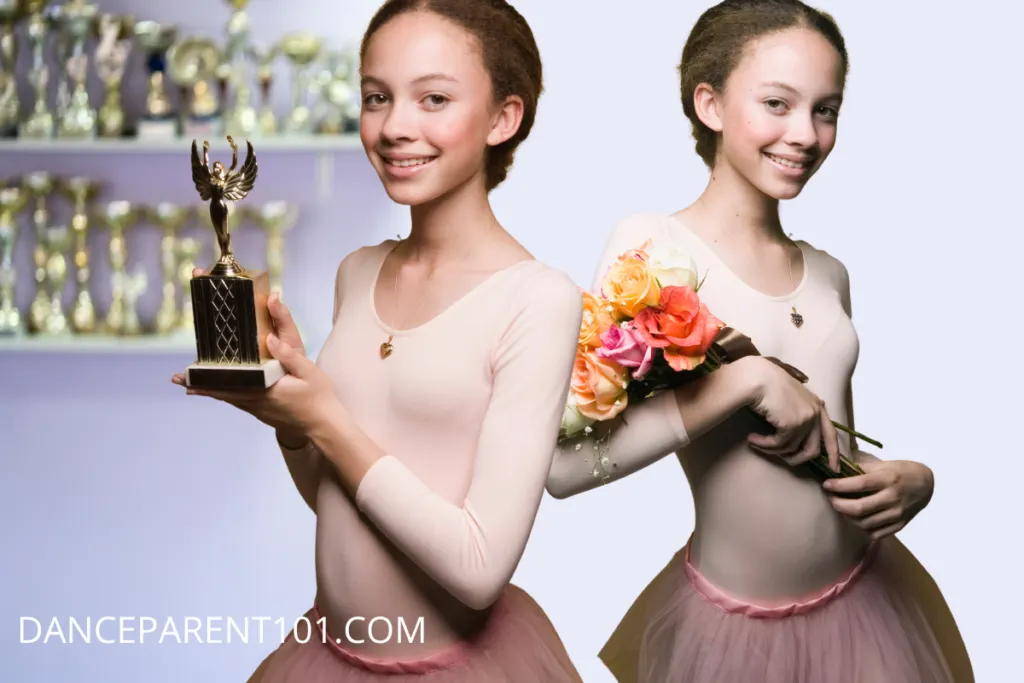My daughter or son is a competitive dancer – is a phrase you might hear proudly stated by a dance mom or dad at the annual family barbeque, or whilst waiting with the other parents at school pick-up. Or maybe you are new to dance and have seen a schedule or list marked competitive dancers or recreational dancers which has you wondering what all these labels are about.

Well, Teresa Nelson, a passionate dance mom of a competitive dancer in the US (the photo above is of her super talented daughter at a competition convention!) has taken the time to explain the difference between the two for all of us who are not quite sure what they mean or what being a competitive dancer entails!
But firstly, to make it clear, in this article when we are discussing competitive dance we are referring to mainstream dance taught in dance studios all over the world in the disciplines or styles such as jazz, tap, ballet, lyrical, musical theatre and acrobatic dance.
Take it away Teresa….
What is a Competitive Dancer?
A competitive dancer is a dancer who has committed to training and competing at a level of excellence.
They will usually attend several competitions throughout the year competing in troupes, duos and solos.
Most competitive dancers train for more hours than others at their studios, taking both mandatory technique classes in several disciplines such as ballet, turns and leaps, jazz, acrobatics or lyrical. On top of this they attend lessons that are necessary to learn and rehearse for their dance competitions.
Dancers who identify themselves as a competitive dancer will frequently travel both regionally and nationally to compete and participate at dance conventions and other events.
This means they do not have time to commit to outside sports and activities and many studios request that students on their competitive team forgo other extracurricular activities to ensure commitment and focus to dance.
Competitive dancers are usually part of a team or studio company and many are required to sign a contract that confirms their commitment to both the fees and training required to perform at an elite level. Competitive dancers are dedicated via the contract to exclusive training at the desired studio.
Dance studio owners establish higher expectations for the competition teams since they are representative of the quality of training at their studio and help create the studio reputation.
Competitive dancers are generally aged between 9-16 however, there are many who are older or younger.
What is a Non-Competitive Dancer?
A non-competitive dancer is a dancer who chooses to not compete.
However, there are many dancers who do not consider themselves to be competitive dancers but who may actually compete in one or two competitions a year.
However, as they rarely focus on preparing for competitions they do not consider this a major part of their identity as a dancer.
Most non-competitive dancers instead focus on working towards obtaining top marks in dance examinations which eventually lead to teaching qualifications or performing in their studio recital or even landing a part in local or professional dance company performance – such as the annual Nutcracker.
What is a Recreational Dancer?
Other dancers may choose to be recreational dancers who train less and only perform at annual recitals or other in-studio events.
Recreational dancers typically take fewer classes and do not need to sign contracts which means they can participate in other sports or activities.

Thanks Teresa, those were some great explanations, however, I just want to reassure parents and dancers reading this that you do not have to do competitive dance to be successful or to have a career in dance at a later stage.
Many recreational and non-competitive dancers go on to have successful careers in dance and on the other hand, many competitive dancers decide they want to stop dancing completely after years on the competition circuit. Both can choose to do dance at college, go to pre-professional training schools or have professional careers.
So which dance journey is better? Only you and your dancer can decide what is best for you!
But as you have read being a competitive dancer and parent of a competitive dancer takes a lot of commitment and so you might want to take a read of a few of our other articles below for more information.
Some other articles you might like to read include:
Which is Better? A Competition Focused or Non Competitive dance school?
12 Pros and Cons of Competitive Ballet & Dance
Dance Competitions Explained – Everything You Want To Know!
How Much It Costs One Family for a Year of Competitive Dance
The Real Costs Of Competitive Dance – A Parent’s Run Down
The pros & cons to starting competitive dance at an early age!
2022 Ultimate USA Dance Competition List by State with Links
